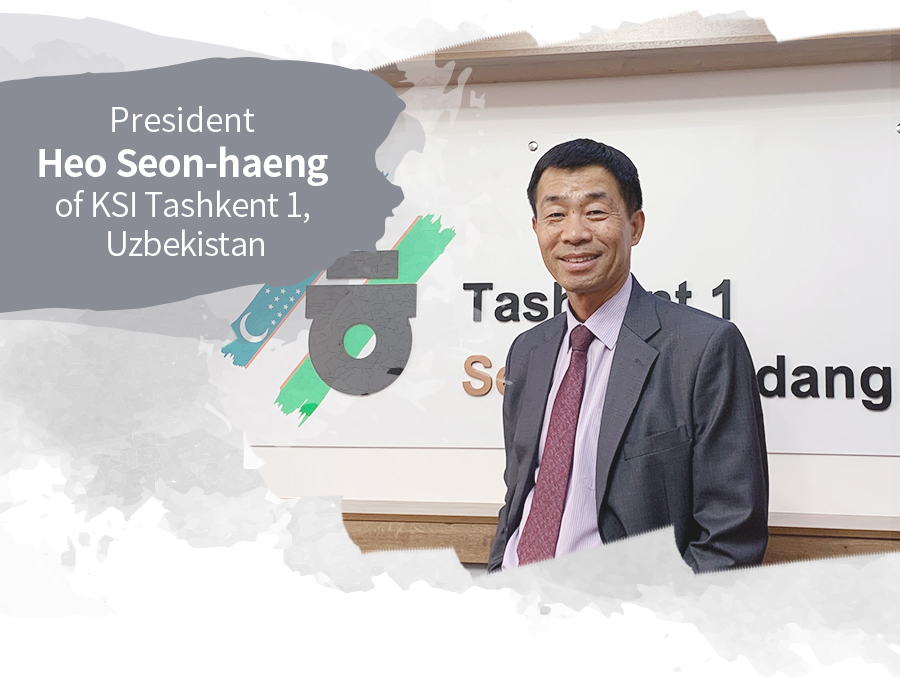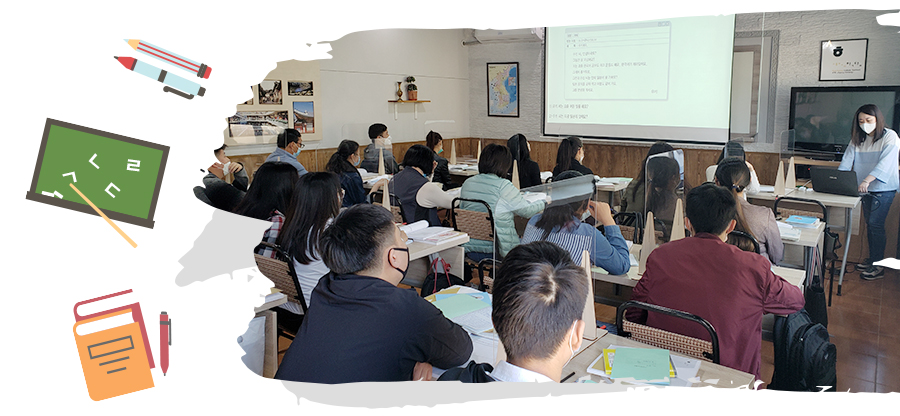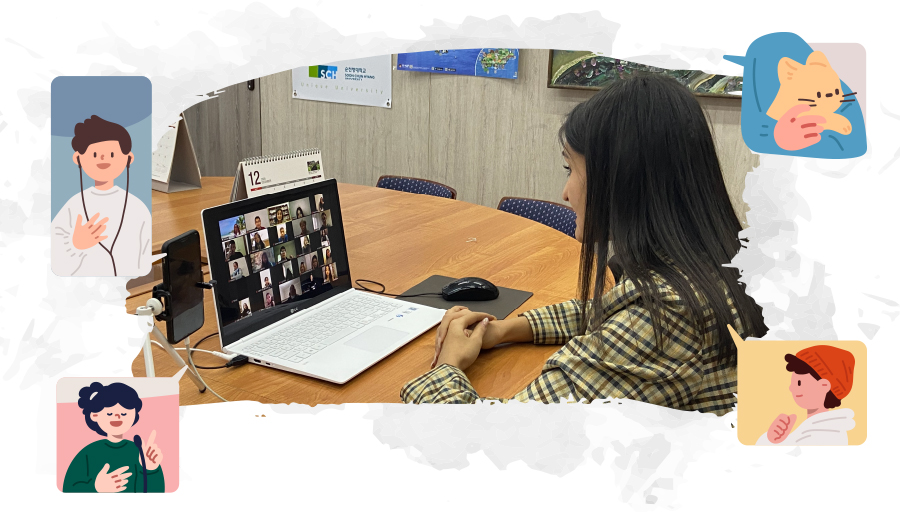'Little Korea' built over 30 years
Writer홍보협력팀
Tag
2021-11-22
View1537



'Little Korea' built over 30 years
It will be 30 years next year since Korea and Uzbekistan established diplomatic ties. It will also be 30 years that President Heo Seon-haeng has been disseminating Korean language and culture in the distant land of Uzbekistan. We have interviewed President Heo Seon-haeng who serves as the cultural bridge connecting the two countries, and who is called "the godfather of Korean education."
 I wonder what path took you so far to lead KSI Tashkent 1?
I wonder what path took you so far to lead KSI Tashkent 1?
In 1991, when I was a graduating senior, I was thinking about the future. A teacher at the time told me about Koryo-saram (ethnic Koreans in the post-Soviet states) that has forgotten their mother tongue. I could see how meaningful it is to bring back their mother tongue to the 500,000 Koryo-saram. The following year, as soon as I graduated, I went to Uzbekistan without hesitation. It has been 30 years already!
Our school has improved so much that we cannot even remember the worn-out appearance of early days when rain would leak in. Now, we have expanded the target from Koreans to local people including teenagers of Uzbekistan to disseminate Korean language and culture. As a result, on the first Korean Day in 2007, we have achieved the first in ranking for Korean language institute evaluation and received a national badge. In 2013, we have also received a presidential commendation in recognition of our contribution to the dissemination of Hangeul.
In addition, in the operation institutions workshop this year, Soon Chun Hyang University, which is our operating institution, received a commendation by the Minister of Culture, Sports and Tourism. I believe this is an achievement we accomplished only through trusting each other and working together. We will take all the awards we received as encouragement to work harder in the future, and lead the institute with ceaseless determination.
 Were there any difficulties before opening KSI Tashkent 1 in 2011?
Were there any difficulties before opening KSI Tashkent 1 in 2011?
Before it was designated as a KSI, the name from 1992 to 2010 was Tashkent Sejong Hangeul School. There were about students who started at the beginning, and as I said earlier, the classroom was old and shabby, almost like an animal shed. However, there is no right time or place for learning. We kept spreading the Korean language and culture, the number of learners increased, and the environment also improved.
Of course, there were difficulties before it was designated as a KSI. At the time, it was not easy for a privately run Korean school to be designated as a KSI. Moreover, since there was already a Korean education institute run by the Ministry of Education in Tashkent, there was an objection to the establishment of two Korean language education institutes in one city. I did not give up though; I visited the Korean Embassy in Uzbekistan many times to persuade them of the need to open a KSI. Finally, in 2011, Tashkent Sejong Korean School was reborn as KSI Tashkent 1. Since then, we were able to operate the institute more systematically and stably with dispatched expert teachers and regular support from the King Sejong Institute Foundation.

 What are the unique characteristics and strengths of KSI Tashkent 1?
What are the unique characteristics and strengths of KSI Tashkent 1?
At our institute, about 450 learners per semester enroll to learn the Korean language and culture. It serves as an organization that teaches the mother tongue to Korean youths and a foreign language to local youths. Meanwhile, we exchange culture in the 'Little Korea' in Uzbekistan. We disseminate Korean culture through various events at our institute. The most popular program is the Korean food-making class offered four times per month. Also, our K-pop club is the best as they are often requested to appear at events arranged by the Korean community or other organizations. As K-pop has gained popularity and interest in Korean movies and dramas has increased recently, the K-pop club also has a considerable influence on attracting new learners.
The beginning can be from a little curiosity about a culture. However, the students who come to our institute not only seek knowledge. They plan their goals and future through Korean language and culture. They work hard to go to study in Korea or get a job at a Korean company. I hope all the learners at KSI Tashkent 1 will realize their dreams.
 How are people’s thoughts on Korean language and culture changing in Uzbekistan?
How are people’s thoughts on Korean language and culture changing in Uzbekistan?
People in Uzbekistan have been interested in Korean language and culture for a long time. They are becoming even more interested through activities of BTS, and as Korean dramas are becoming more popular through OTT. For example, I once used a video of a BTS speech at the UN for the class, and I found that many learners had already seen the video. In addition, thanks to the sudden global popularity of Squid Game, there are cafes that sell dalgona cookies. I also saw a teacher and students playing Mugunghwa kkochi pieosseumnida ('red light green light') in the yard. Surprisingly, it was the students who knew the rules of the game better than the teacher. I came to realize how much the status of Korean culture has risen.

 What is the most memorable thing during the time you operated KSI Tashkent 1?
What is the most memorable thing during the time you operated KSI Tashkent 1?
Every student is a precious memory to me. Many students warmed my heart in different ways. The student who brought me a gift he bought with his first salary after getting a job at a Korean company, and another that always comes back to the institute every vacation while he’s studying in Korea, etc. I would like to talk about two of them.
The first one is a student called Park Yulia. Yulia is a gifted person who was in charge of interpretation for the Russian president during the G20 in 2010. On Parents’ Day of 2013, I received a letter from Yulia. I remember my heart aching the moment I read the first line. Rather than explain how I felt, I would like to share the content of the letter instead.

To. My most respected teacher, and the only father I have
I was in a good mood all evening after hearing the voice of my beloved father.
Thank you for always thinking about and taking care of me when you have so many other things to worry about. You wouldn’t know how meaningful it is to have a father like you who always trusts and supports me. I am always thankful to God for sending you to me.
After I met you, I started wanting a father for the first time, and imagined how it would be to have a father like you. Thank you for being such a kind father to me, and for making me feel what the love of a father is.
Dad, happy Parents’ Day!
I will do my best to become a person who gives love and hope to people, as you lit up the paths for many learners.
Thank you, and I always love you!
Yulia

The second one I want to tell you about is Gulzhan. She achieved her dream and now is working as a flight attendant. One day, I was on an airline flight on which Gulzhan worked. She came running to me first and greeted me, saying “Hello, Mr. Principal! I was able to become a flight attendant thanks to you. Thank you!” I was so happy and proud at the moment, I felt like I was soaring even higher than that plane!
 How is KSI Tashkent 1 responding to the COVID pandemic?
How is KSI Tashkent 1 responding to the COVID pandemic?
Following the guidelines of the government, our institute changed the classes to non-face-to-face from last March. In the beginning, it was difficult for both teachers and learners to adjust to the non-face-to-face classes. So I did not charge tuition for a semester, and provided all learners an opportunity to adapt to online classes. As a result, students gradually adapted to the situation. As the situation is improving these days, we're conducting face-to-face classes at the same time to compensate for the times we could not meet in person.

 Please tell us about the future goals and plans of KSI Tashkent 1.
Please tell us about the future goals and plans of KSI Tashkent 1.
Next year marks the 30th anniversary of diplomatic relations between Korea and Uzbekistan. For this, we’re planning to hold an academic conference to seek ways to develop King Sejong Institutes in Central Asia, as well as a cultural event. In addition, we plan to establish a system to conduct interactive classes at the same time, so that we can respond more actively to the pandemic. Please come and experience Korean language and culture without restrictions of time and distance at KSI Tashkent 1!

